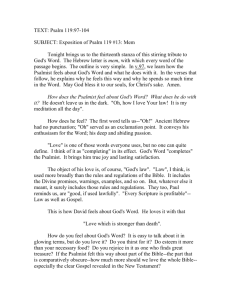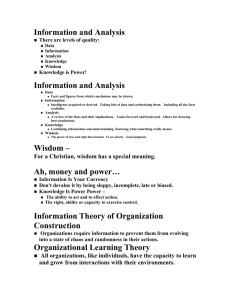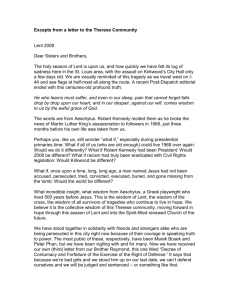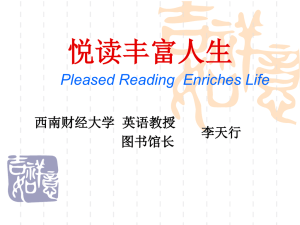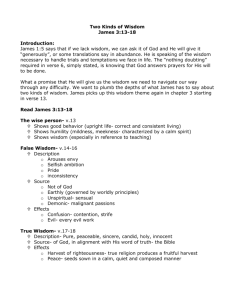The Philosophy and Psychology of Wisdom
advertisement
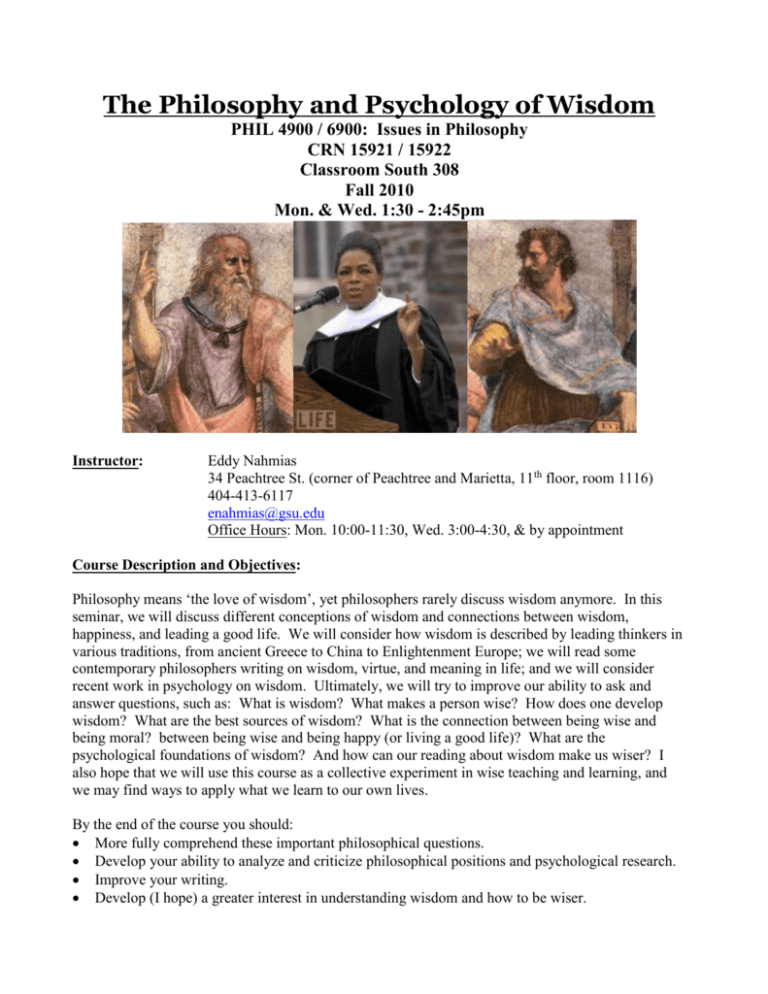
The Philosophy and Psychology of Wisdom PHIL 4900 / 6900: Issues in Philosophy CRN 15921 / 15922 Classroom South 308 Fall 2010 Mon. & Wed. 1:30 - 2:45pm Instructor: Eddy Nahmias 34 Peachtree St. (corner of Peachtree and Marietta, 11th floor, room 1116) 404-413-6117 enahmias@gsu.edu Office Hours: Mon. 10:00-11:30, Wed. 3:00-4:30, & by appointment Course Description and Objectives: Philosophy means ‘the love of wisdom’, yet philosophers rarely discuss wisdom anymore. In this seminar, we will discuss different conceptions of wisdom and connections between wisdom, happiness, and leading a good life. We will consider how wisdom is described by leading thinkers in various traditions, from ancient Greece to China to Enlightenment Europe; we will read some contemporary philosophers writing on wisdom, virtue, and meaning in life; and we will consider recent work in psychology on wisdom. Ultimately, we will try to improve our ability to ask and answer questions, such as: What is wisdom? What makes a person wise? How does one develop wisdom? What are the best sources of wisdom? What is the connection between being wise and being moral? between being wise and being happy (or living a good life)? What are the psychological foundations of wisdom? And how can our reading about wisdom make us wiser? I also hope that we will use this course as a collective experiment in wise teaching and learning, and we may find ways to apply what we learn to our own lives. By the end of the course you should: More fully comprehend these important philosophical questions. Develop your ability to analyze and criticize philosophical positions and psychological research. Improve your writing. Develop (I hope) a greater interest in understanding wisdom and how to be wiser. Responsibilities and Assessment: Attendance, Preparation, and Participation (20%): You are expected to come to every class having read and thought about the assigned material. In general, you should plan on spending an average of at least four hours per week outside of the classroom reading, preparing, and when relevant, researching and writing for this class. This course will be run as a seminar with lots of discussion. Your attendance and informed, active participation in class discussions are required both for the course to succeed and for you to succeed in the course: 20% of your final grade will be based on how constructive your participation in the class is (and your project presentation— see below). As a rule, you should neither go more than two or three classes without offering your informed questions and perspectives, nor should you dominate any class discussions. Missing more than two classes without approved excuse will lower your participation grade. Nuggets of Wisdom (40%): You will write 10 “Nuggets of Wisdom” (NoWs) about the sources of wisdom we read. We will discuss the form and content of these writing assignments more fully in class, because they may take various forms (e.g., one may be an interview, etc.). But in general, they will involve 2-3 pages (about 400-700 words) indicating that you have engaged carefully with the central reading assigned, either (1) by analyzing how the discussion of wisdom in it can be applied to some concrete decision, action, or characteristic displayed in a work of literature or film, or in your own life or the life of someone you know, and/or (2) by analyzing the philosophical argument in the reading (e.g., offering a short critique of or counterexample to one of the claims made about wisdom, wise persons, etc.). We will decide whether we want our NoWs to be available on the course website or turned in just to me. Either way, they will target one of the main readings assigned for a class and be due before that class. You will do one NoW per week during weeks 2-13 (with one week off) for a total of 10 NoWs, the best 8 of which will be counted for 40% of your final grade (but if you do some number X fewer than 10, you will get F grades for X; e.g., if you do only 8, two F grades will count). Wisdom Project (40%) and Presentation: You will do research on some “source(s)” of wisdom not covered in class (from philosophy, religion, psychology, or even literature or some other source), and create a paper and a presentation in which you explain and explore that source of wisdom, using it in part to develop your own views about wisdom and living wisely (or perhaps to develop an empirical study of wisdom). These projects may take various forms, and we will discuss the possibilities more in class. You will turn in a proposal for your wisdom project, including your source(s) no later than October 28. You will create a 7-10 minute presentation of your project for the class during one of the last three classes (after Thanksgiving)—these presentations may also take various forms, and they will count as a significant part of your participation grade. Your written project will be—barring creative diversions from this format which must be approved—an 8-10 page paper (10-15 pages for graduate students) and will count 40% of your final grade. It must be turned in no later than the last class (December 6). Graduate Students Extra Sessions: Graduate students enrolled in PHIL 6900 will meet for an additional 3-4 sessions (to be scheduled), for which they will read additional work (e.g., those listed as “Suggested” on the schedule) and/or do extra assignments (to be discussed). Course Policies: Attendance and classroom courtesy: Attendance is essential for success in this course, and it will be taken at each class. Given your careful reading and Nuggets of Wisdom, you should have answers to questions I ask, as well as insightful questions and comments about the reading for each class. You will also have disagreements with what I say and with what your classmates say, and you should express these critiques when appropriate. But in disagreeing, do not be disrespectful. Practice critiquing ideas without criticizing people. Please show respect as well by: (1) Arriving to class on time and remaining seated until we complete the day’s discussion; (2) Staying alert and focused on our discussion; (3) Refraining from conversations while others are speaking; (4) Turning off cell phones before class and keeping them out of sight (no texting, etc.); (5) Using computers only for class-related activity (and please ask permission to use computers). Late work and excused absences: All assigned work will be due before or at the beginning of class. Unless the student provides acceptable written documentation (e.g., medical provider’s note), absences will not be excused, NoWs cannot be turned in late, and late projects will be penalized (5 points per day). If you know you will miss a class, let me know ahead of time and we can work something out (observation of religious holidays will be excused). Academic Honesty: Students are expected to strictly uphold the Academic Honesty Policy of Georgia State University. The instructor reserves the right to assess penalties for violations, which may involve a failing grade for the assignment or for the entire course. Plagiarism includes submitting written work which you have not composed yourself or using another person’s ideas without proper citation. For instance, if I run your paper through a search site on the internet and find any uncited sentences that match an outside source, I will consider it a plagiarized paper. Students requiring accommodation: I am happy to accommodate students with disabilities or other needs who require academic accommodation. Please speak to me in the first two weeks of classes. Teacher Support: I am happy to discuss questions or problems during scheduled office hours or by appointment. Quick questions can be answered right after class. Student Support: You should work with each other to discuss and better understand the issues, get notes for missed classes, and discuss projects. I highly recommend you exchange contact information with at least two classmates for these purposes. Flexibility: This course syllabus provides a general plan for the course; deviations may be necessary (e.g., assigned readings may change, and we will almost always have to finish discussion of the previous class’ readings at the beginning of class). Texts: There are no required books for this course, though you may want to purchase some of the main texts. All assigned readings will be available primarily through the course website at uLearn or as handouts or through email. Department of Philosophy General Syllabus Statement Fall 2010 This syllabus provides a general plan for the course. Deviations may be necessary. The last day to withdraw from a course with the possibility of receiving a W is Friday, October 8. Students are responsible for confirming that they are attending the course section for which they are registered. Failure to do so may result in an F for the course. By University policy and to respect the confidentiality of all students, final grades may not be posted or given out over the phone. To see your grades, check the web (student.gosolar.gsu.edu). The customary penalty for a violation of the academic honesty rules is an "F" in the course. See the University Policy on Academic Honesty at http://www2.gsu.edu/~wwwfhb/sec409.html. Copying or using material from the internet without citation is a violation of the academic honesty rules. A student may be awarded a grade of "W" no more than 6 times in their careers at Georgia State. After 6 Ws, a withdrawal is recorded as a WF on the student's record. A WF counts as an F in a GPA. Your constructive assessment of this course plays an indispensable role in shaping education at Georgia State University. Upon completing the course, please take the time to fill out the online course evaluation. A+ grades are not parallel to grades of B+ and C+. They are reserved for outstanding work that merits recommendation to a top-five philosophy Ph.D. program. This policy applies only to courses taught by philosophy faculty. Students who wish to request accommodation for a disability may do so by registering with the Office of Disability Services in Suite 230 of the Student Center. Students may only be accommodated upon issuance by the Office of Disability Services of a singed Accommodation Plan and are responsible for providing a copy of that plan to instructors of all classes in which an accommodation is sought. Subscribe to one of our department listservs for current information and events: 1. Philosophy Majors: www2.gsu.edu/~wwwphi/5267.html 2. Philosophy Grad Students: www2.gsu.edu/~wwwphi/5265.html Messages will go to the address from which you send the message, so you need to resubscribe every time you change e-mail addresses. For more information on the philosophy program visit: www.gsu.edu/philosophy Schedule of Readings and Assignments (subject to modifications): Week 1: M 8/23: W 8/25: Introductions Introduction to wisdom, each other, syllabus Concepts of wisdom, measuring wisdom Bluck and Glück, “From the Inside Out: People’s Implicit Theories of Wisdom” Week 2-3: M 8/30: Socrates, MLK, Plato, and Aristotle on Wisdom Socrates, The Apology Martin Luther King Jr., “Letter from a Birmingham Jail” Plato, selections from The Republic * NoW 1 due no later than this class* W 9/1: M 9/6: W 9/8: Suggested: Labor Day, No Class Aristotle, selections from Nichomachean Ethics and Metaphysics Broadie, from Ethics with Aristotle Hursthouse, “Practical Wisdom: A Mundane Account” Week 4: M 9/13: W 9/15: Stoic Wisdom Epictetus, The Enchiridion (The Handbook) Marcus Aurelius, selections from Meditations Cicero, selections from On Moral Ends Week 5: M 9/20: W 9/22: Suggested: Chinese Wisdom Confucius, selections from Analects Selections from Tao Te Ching and Zen Buddhism or Shantideva Way of the Bodhisattva Kupperman, “Morality, Ethics, and Wisdom” Week 6: M 9/27: Religion and Wisdom Wisdom literature from The Old Testament Jesus’ sermons from The New Testament Pojman, “Religion Gives Meaning to Life” Nozick, “Philosophy and the Meaning of Life” Anderson, “If God is Dead, is Everything Permitted?” Russell, from Why I am not a Christian Nagel, “Secular Philosophy” W 9/29: Suggested: Week 7: M 10/4: W 10/6: Suggested: Enlightenment Wisdom Montaigne, selections from Essays Rousseau, selections from Emile and Moral Letters Adam Smith, selections from Theory of the Moral Sentiments Robinson, “Wisdom through the Ages” Selections from Shopenhauer and Nietzsche Weeks 8-10: M 10/11: W 10/13: Psychology on Wisdom and Self-knowledge Sternberg, Introduction to Wisdom: Its Nature, Origin, and Development Ardelt, Introduction to A Handbook of Wisdom: Psychological Perspectives Implicit theory article (TBA) Baltes and Staudinger, “Wisdom: A Metaheuristic (pragmatic) to Orchestrate Mind…” Ardelt, “Empirical Assessment of a Three-Dimensional Wisdom Scale” M 10/18: W 10/20: Suggested: Sternberg, “A Balance Theory of Wisdom” Csikszentmihalyi and Nakamura, “The Role of Emotions in the Development of Wisdom” Staudinger and Gluck, “Psychological Wisdom Research” M 10/25: W 10/28: Haidt (TBA) Wilson (TBA) * Wisdom Project Proposal Due * Weeks 11-13: M 11/1: W 11/3: Suggested: Recent Philosophy on Wisdom, Virtue, Meaning, and Happiness Tiberius, “Wisdom and Happiness” Tiberius and Swartwood, “Wisdom Revisited” Taylor, “Dare to be Wise” M 11/8: Ryan, “Wisdom” Garrett “Three Definitions of Wisdom” Zagzebski, “The Admirable Life and the Desirable Life” Kekes, “Wisdom” W 11/10: Suggested: M 11/15: W 11/17: Nozick, selections from The Examined Life Wolf, “Happiness and Meaning” or “Meaning in Life” * 10 NoWs due no later than this class * * Thanksgiving Break, No Classes * Weeks 14-15: Wisdom Projects M 11/29: A wise piece of literature (TBA) Presentations W 12/1: Presentations M 12/6: Presentations, Conclusions, Final Pieces of Wisdom (and of Pizza) * Wisdom Project Due *


